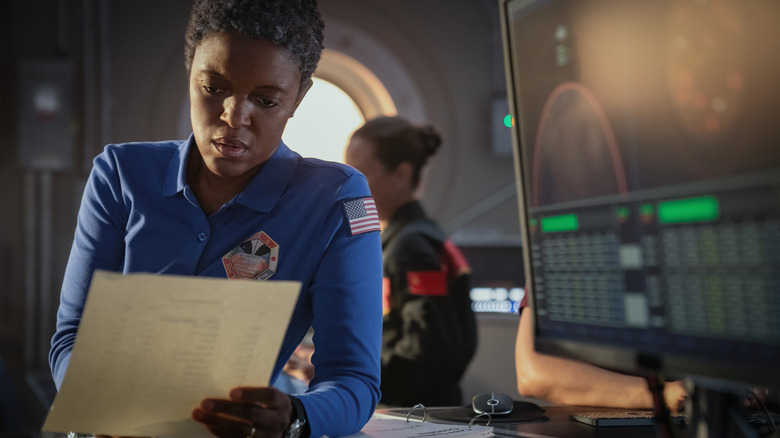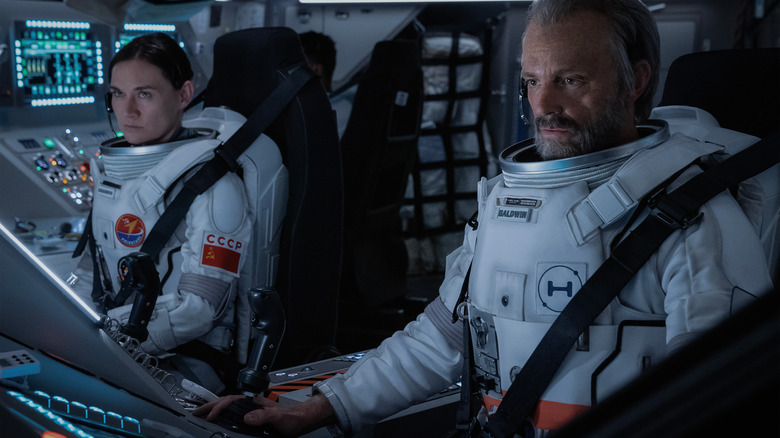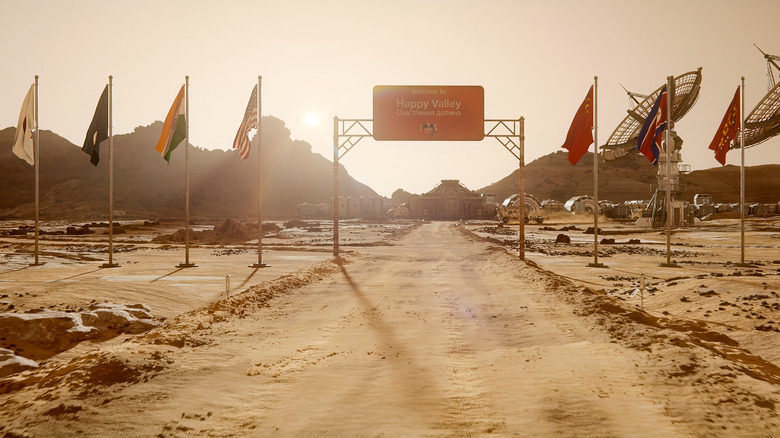For All Mankind Season 4 Review: Another Giant Leap For Apple's Smart And Thrilling Space Drama
At what point did "For All Mankind" truly come into its own? Maybe it was as early as its resounding debut season, which flipped one of the most pivotal events in human history on its head — the United States beating the Soviet Union to the moon — with an alternate-history twist where Russia had won the space race and reinvigorated the Cold War. Then again, season 2 was the one to use this fascinating jumping-off point to achieve even greater heights, melding human conflicts and space nerdery into one ambitious storyline about the series of small, personal choices made in narrowly avoiding the onset of World War III in the 1980s. When season 3 took the action all the way to Mars another decade later with much of the original cast still involved, it was easy to imagine the whole enterprise coming apart at the seams. Instead, the series embraced its own flawed (but three-dimensional) characters, incorporated a boatload of incisive political commentary (complete with an Elon Musk stand-in), and relied on perhaps a few too many soap opera theatrics on its way to a properly explosive finale.
Encouragingly, season 4 of "For All Mankind" picks up right where it left off and doesn't miss a single beat.
Set eight years after the events of season 3, the Apple TV+ series (which, this year, could be cheekily rebranded "2003: A Space Odyssey") returns in the early aughts to a whole new status quo. A shockingly well-oiled multinational effort back home on Earth supports the now-thriving Mars colony dubbed Happy Valley, home to a small community of both new and familiar faces. The traditional season-opening exposition dump catches audiences up on what's gone down in the intervening years, from Al Gore soundly winning the 2000 Presidential election to the creation of the global "M-7 Alliance." Having united world superpowers like America and Russia along with private space company Helios, the three main players in the race to Mars last season, Cold War tensions seem to have finally thawed and allowed humanity to reach the next phase of space exploration: mining nearby asteroids for their precious resources.
But, as "For All Mankind" has deftly depicted many times before, even this generation-defining opportunity for cooperation and collective progress can't stave off mankind's all-too-real failings. By the end of the seven episodes (out of 10 total) that Apple screened to critics ahead of time, competing self-interests, decades-old geopolitical rivalries, and numerous interpersonal conflicts finally come to bear. What we're left with is a thrilling reminder that, when firing on all cylinders, "For All Mankind" leaves most other sci-fi in the dust.
Shadows of the past
It might seem like a misnomer for a series as forward-thinking as "For All Mankind" to concern itself so deeply with its own past, but season 4 confidently pays off four years of viewer investment in these characters and almost 40 years of in-universe history. Stacking a web of what might initially seem like disconnected narratives on top of one another, the early episodes get all the necessary table-setting out of the way for the latter half of the season to get in gear. The choice to distance each season with significant time-jumps could've been the kiss of death — and it's certainly done much to both help and hinder the stakes in seasons past — but season 4 takes full advantage of the passage of time by making the weight of history (and, yes, some dicey-looking wigs) keenly felt.
This largely manifests by bringing us up to speed on our new and returning cast of characters alike. Joel Kinnaman reprises his role as grizzled astronaut Ed Baldwin, now old enough to require another heaping coat of old-age makeup and a receding hairline aided by a semi-convincing bald cap — though, unlike past years, this actually juxtaposes nicely with the fiery, almost youthful determination burning in Kinnaman's eyes as Ed fights against being relegated to the dustbin of history. Meanwhile, we're quickly introduced to prominent newcomers like Daniel Stern's NASA administrator Eli Hobson and Toby Kebbell's Miles Dale, a struggling blue-collar worker who stumbles onto the chance to provide for his family by taking to the stars. In ways too interesting to spoil, his subplot eventually dovetails nicely with the rest of the season and allows a natural way for other figures to join the story, like legendary NASA hero Danielle Poole (the always-reliable Krys Marshall), Soviet-sympathizing defector Margo Madison (Wrenn Schmidt, easily the biggest casualty of needing to seem older than the actor actually is), Ed's daughter Kelly (Cynthy Wu), the ever-stubborn Aleida Rosales (Coral Peña), hotshot billionaire Dev Ayesa (Edi Gathegi), and even the loose thread regarding the fate of troublesome Danny Stevens (Casey W. Johnson). Every major protagonist we've come to know and love gets their moment to shine ... or to fail spectacularly.
As easy as it could've been to lose track of such a sprawling ensemble, creators Ronald D. Moore, Matt Wolpert, and Ben Nedivi and their writing team constantly find creative solutions. Over the course of the season, far-flung characters are carefully brought together and bitter histories are unearthed for major confrontations — some of which have been 30 years in the making. Whether it's past-his-prime Ed reverting to his pot-stirring ways or Aleida's PTSD from last season's space center bombing or one particular narrative thread that hits particularly hard in light of recent Hollywood events, the past just keeps coming back to haunt the present in a major theme of the season. In so doing, "For All Mankind" continues to have its finger firmly on the pulse.
Pushing the limits
Having always balanced its aims as both a sci-fi and unapologetically political series, "For All Mankind" once again re-establishes itself as a nuanced, challenging, and relevant work that's less reminiscent of "Star Trek" and more like "The Americans" in space. That means doubling down on daring plot twists and last-minute complications that only ever enrich the drama and stakes at hand, aided by a stable of directors (which includes Lukas Ettlin, Dan Liu, Sylvain White, and Maja Vrilo) and a writing team (comprised of Matt Wolpert, Ben Nedivi, Andy Black, David Weddle, Bradley Thompson, Kate Burns, Eric Phillips, Jovan Robinson, and Sabrina Almeida) working in perfect tandem. Although "For All Mankind" has largely established a house style that takes its cues from docudrama aesthetics, the most exciting moments come from bending the rules with, say, a striking split-screen montage in episode 2 or playing against tonal expectations with the consistent work of composer Jeff Russo. All throughout, season 4 unfolds with a breathless pace and a tight grip on story that invites viewers to simply come along for the ride.
Like in prior years, season 4 wears its love of science and progress on its sleeve with a refreshing sense of earnestness, though never at the expense of depicting the very real dangers of space. Shocking deaths, fateful decisions made in a split second, and learning to live with the stark reality of regret are all par for the course, even as early as the premiere. Over and over again, our heroes are beset by impossible problems with no straightforward answers. And, at times, it almost feels like the show itself finally gives in to cynicism.
But the true pleasure of watching this series for yet another installment comes from its ability to find meaning and purpose amid the noise of chaos. Like any worthwhile piece of science fiction, "For All Mankind" isn't just telling its own story — it's telling our story. Underneath the alternate-universe trappings, nerdy attention to detail, and (occasionally) scientifically dubious concepts, the beating heart of this show is a plea for humanity to come together for the greater good ... along with a cautionary tale of what happens when we don't. In season 4, this dichotomy is on full display like never before, and, as a result, "For All Mankind" has never felt more urgent.
/Film rating: 8 out of 10
"For All Mankind" season 4 premieres on Apple TV+ November 10, 2023.


